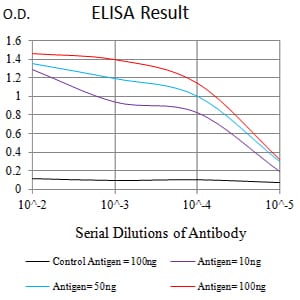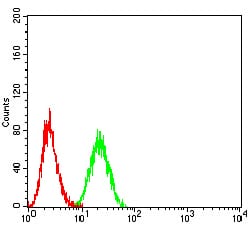

| WB | 咨询技术 | Human,Mouse,Rat |
| IF | 咨询技术 | Human,Mouse,Rat |
| IHC | 咨询技术 | Human,Mouse,Rat |
| ICC | 技术咨询 | Human,Mouse,Rat |
| FCM | 1/200 - 1/400 | Human,Mouse,Rat |
| Elisa | 1/10000 | Human,Mouse,Rat |
| Aliases | CTLA4; CD; GSE; GRD4; ALPS5; CTLA-4; IDDM12; CELIAC3 |
| Entrez GeneID | 1493 |
| clone | 8B3F8 |
| WB Predicted band size | 24.6kDa |
| Host/Isotype | Mouse IgG1 |
| Antibody Type | Primary antibody |
| Storage | Store at 4°C short term. Aliquot and store at -20°C long term. Avoid freeze/thaw cycles. |
| Species Reactivity | Human |
| Immunogen | Purified recombinant fragment of human CD152 (AA: extra 36-161) expressed in E. Coli. |
| Formulation | Purified antibody in PBS with 0.05% sodium azide |
+ +
以下是关于CD152(CTLA-4)抗体的3篇重要文献参考:
1. **文献名称**:**"Enhancement of Antitumor Immunity by CTLA-4 Blockade"**
**作者**:Leach, D.R., et al. (Allison, J.P. 为通讯作者)
**摘要**:该研究首次在小鼠模型中证实,阻断CTLA-4(CD152)的抗体可显著增强抗肿瘤免疫反应,抑制肿瘤生长,为后续免疫检查点抑制剂开发奠定基础。
2. **文献名称**:**"Improved Survival with Ipilimumab in Patients with Metastatic Melanoma"**
**作者**:Hodi, F.S., et al.
**摘要**:III期临床试验证明,抗CTLA-4抗体Ipilimumab(伊匹木单抗)可显著延长晚期黑色素瘤患者总生存期,首次确立CTLA-4抗体在癌症治疗中的临床价值。
3. **文献名称**:**"Principles and use of anti-CTLA-4 antibody in cancer immunotherapy"**
**作者**:Peggs, K.S., et al.
**摘要**:综述性文章,系统阐述CTLA-4的免疫抑制机制及抗体药物的作用原理,讨论其在单药或联合治疗中的应用潜力及面临的毒性管理挑战。
4. **文献名称**:**"Anti-CTLA-4 antibodies in combination with anti-PD-1 therapy enhance T-cell responses in advanced cancers"**
**作者**:Robert, C., et al.
**摘要**:探索CTLA-4抗体(如Ipilimumab)与PD-1抑制剂联用的协同效应,临床数据显示联合疗法显著提升晚期黑色素瘤等肿瘤的客观缓解率,但需平衡增加的免疫相关不良反应风险。
这些文献涵盖了从基础机制到临床转化的关键研究,反映了CTLA-4抗体在肿瘤免疫治疗中的里程碑进展。
CD152. also known as cytotoxic T-lymphocyte-associated protein 4 (CTLA-4), is a critical immune checkpoint receptor expressed primarily on activated T cells and regulatory T cells (Tregs). Discovered in the late 1980s, it functions as a negative regulator of T-cell activation by binding to B7-1 (CD80) and B7-2 (CD86) ligands on antigen-presenting cells (APCs) with higher affinity than the co-stimulatory receptor CD28. This interaction suppresses T-cell signaling, preventing excessive immune responses and maintaining peripheral tolerance. Dysregulation of CTLA-4 is linked to autoimmune diseases and cancer.
CD152 antibodies, such as ipilimumab, were developed to block CTLA-4’s inhibitory signals, thereby enhancing T-cell-mediated anti-tumor immunity. Approved in 2011 for metastatic melanoma, ipilimumab became the first immune checkpoint inhibitor to demonstrate prolonged survival in advanced cancer. However, its use is limited by immune-related adverse events (irAEs) due to systemic immune activation. Research continues to optimize dosing, combination therapies (e.g., with PD-1/PD-L1 inhibitors), and biomarkers for patient selection. Newer anti-CD152 agents, including bispecific antibodies or those targeting specific Treg subsets, aim to improve efficacy while reducing toxicity. Understanding CD152’s dual role in immune regulation and tolerance remains central to advancing cancer immunotherapy and autoimmune disease treatments.
×